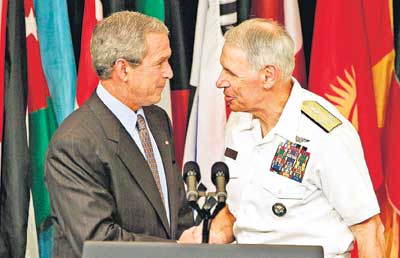
More blows to US imageNEW YORK - The Bush administration's disastrous Middle East policy took a more severe beating last week as it remained crippled by increasing political setbacks in Palestine, Iraq and Iran. With the escalation of the conflict between Hamas and Israel, a collective Arab plan unveiled six years ago, to declare peace with the Jewish state, has been indefinitely suspended. At the same time, a much-ballyhooed US proposal to usher in a new Palestinian state before President Bush steps down next January has been undermined by the Israeli military onslaught on Palestinians, and the creation of illegal new settlements in occupied territories.
Meanwhile, as the Bush administration keeps beating its war drums, the top US commander in the Middle East, Admiral William J. Fallon, head of the US Central Command, resigned last week over a sharp disagreement on Iraq and Iran. Fallon not only urged a more rapid drawdown of American troops in Iraq but also called for a diplomatic engagement with Iran, thereby undermining a right-wing demand for a military attack on that country. An article in Esquire magazine says that Fallon "brazenly challenged his commander-in-chief," namely the president of the United States, specifically on Iran, arguing against any military attacks on Tehran. The magazine said that Fallon "is as patient as the White House is impatient" and "as methodical as President Bush is mercurial." With "five or six pots boiling over" in the Middle East/South Asia region — designated by the US as "Central Command" — "our nation can't afford to be mesmerized by one problem," Fallon is quoted as saying. The question is: did Fallon jump or was he pushed. The Bush administration denies he was forced to resign despite his disagreement with the President, who apparently does not tolerate dissent. "It's distressing that Admiral Fallon feels he had to step down," Senator Edward Kennedy, a Democrat, said last week, perhaps in an attempt to score political points against a Republican President. Kennedy also said that Bush's "oft-repeated claim that he follows the advice of his commanders on the ground rings hollow if our commanders don't feel free to disagree with the President." Still, a valid point, despite its political overtones. A second bombshell to hit the White House last week was a detailed review — on the war on Iraq — conducted on behalf of the military's Joint Forces Command by the Institute for Defence Analyses. After examining some 600,000 (yes, 600,000) Iraqi documents and audio and video records collected by American forces after the March 2003 invasion of Iraq, the Institute concluded there is no evidence — "no smoking gun" — to link the Saddam Hussein regime to al-Qaeda. That perceived link — stretching all the way to the al-Qaeda terrorist attacks on the US — was one of the primary reasons to justify the American invasion of Iraq (which, incidentally, marks its inglorious fifth anniversary this month). A second reason was that Iraq possessed weapons of mass destruction. On both counts, the Bush administration has been proved wrong. The review, titled "Saddam and Terrorism: Emerging Insights from Captured Iraqi Documents," says the Iraqi president had no direct connection to al-Qaeda, although he had ties to other regional and international terrorist organisations. But even these, including links to Palestinian groups, were "largely non-operational and aimed to bolster his credentials as an Arab leader," according to the Washington Post. When then US Secretary of State Colin Powell addressed the UN Security Council in February 2003 he tried to convince the world body of the "sinister nexus" between Saddam Hussein and al-Qaeda. But, in hindsight, that was based on flawed evidence. Mercifully, the Security Council which refused to authorize the US war on Iraq, wasn't taken for a ride. But still, the Bush administration had no compunction in going to war. All of these events, undoubtedly, has dented the US image the world over — and particularly so in the Middle East. Last week the French Foreign Minister Bernard Kouchner, a strong political supporter of the Bush administration, was asked whether the US has a chance of salvaging its political reputation damaged by the war. "It will never be as it was before," Kouchner said. "I think the (American) magic is over. He said Bush's successor, who will take office next January, will have a daunting political task. "There are many means to re-establish the image," but he warned that it will take time. Nobody knows how long that will be — irrespective of whether the next US President is going to be John McCain, Hillary Clinton or Barack Obama. |
|
||||||
|| Front
Page | News | Editorial | Columns | Sports | Plus | Financial
Times | International | Mirror | TV
Times | Funday
Times || |
| |
Reproduction of articles permitted when used without any alterations to contents and a link to the source page.
|
© Copyright
2008 | Wijeya
Newspapers Ltd.Colombo. Sri Lanka. All Rights Reserved. |
